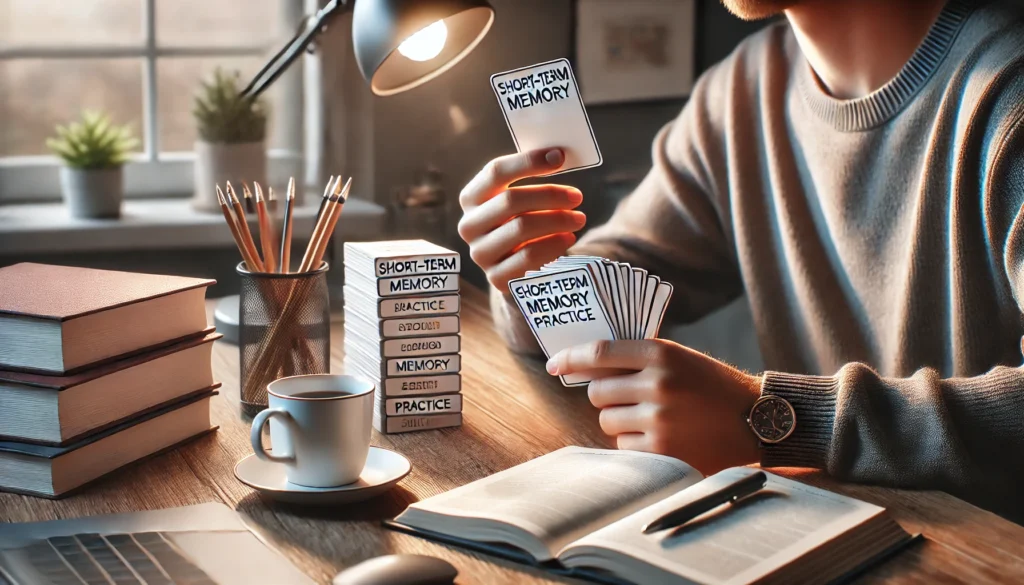Memory is a fascinating aspect of human cognition. It’s a complex system that allows us to store, retain, and recall information.
One key component of this system is short-term memory. It’s a type of memory that holds a small amount of information for a brief period.
Think of it as a mental notepad. It’s where we jot down phone numbers, grocery lists, or directions.
But what exactly is short-term memory? How does it work? And why is it so crucial to our daily lives?
In this article, we’ll delve into the world of short-term memory. We’ll explore its definition, its role in our daily activities, and the psychology behind it.
We’ll also discuss its duration and capacity. How long do short-term memories last? How much information can it hold?
Moreover, we’ll examine the distinction between short-term and long-term memory. We’ll look at their differences in terms of encoding, storage, and retrieval.
Finally, we’ll provide practical strategies to enhance short-term memory. Whether you’re a fitness enthusiast, a health enthusiast, or a medical patient, this article will offer valuable insights to help you optimize your cognitive function.
You may also like: Top 10 Short-Term Memory Boosters
What is Short Term Memory?
Short-term memory is a fundamental part of our cognitive system. It allows us to hold and process information briefly. It acts as a gateway for information entering our consciousness.
In psychology, short-term memory is best described as the capacity to store small amounts of data for a short period. This usually spans from several seconds to about a minute.
One common way to define short-term memory is its ability to manage a handful of items. Typically, it can handle around seven items at once. This is often referred to as the “magic number seven.”
Let’s consider a simple example. When someone tells you a phone number, your short-term memory helps you remember it long enough to dial the number. However, without repetition, the memory fades quickly.
To better understand, here’s a basic breakdown of its characteristics:
- Capacity: Holds around 7 items
- Duration: Lasts up to 30 seconds
- Function: Temporary workspace for information processing
Despite its limitations, short-term memory plays a crucial role. It allows us to engage in complex cognitive tasks such as learning, reasoning, and problem-solving.
Short-term memory is also known as primary or working memory. It temporarily stores information before transferring it to long-term memory, if necessary. By acting as a buffer, it prevents information overload.
This kind of memory is crucial for day-to-day activities. It enables us to navigate the world efficiently and effectively. Without it, even simple tasks would become overwhelming.
Short Term Memory in Daily Life
Short-term memory is constantly at work in our everyday lives. It supports numerous tasks, both simple and complex. A clear grasp of how we use it daily underscores its importance.
Imagine you’re cooking a new recipe. You read a step and then glance at your ingredients. Short-term memory helps you recall what you just read long enough to find the right ingredient.
Another example is engaging in a conversation. Your short-term memory holds on to recent words and phrases so you can respond appropriately. This dynamic interplay enhances communication.
Shopping is another everyday task where short-term memory is invaluable. Whether browsing aisles or comparing prices, it aids in remembering various items temporarily. This mental juggling keeps us organized.
Additionally, short-term memory affects our ability to perform mental calculations. Consider the effort of adding a series of numbers in your head. Holding temporary sums is part of this cognitive exercise.
Even while navigating the streets, short-term memory guides us. Remembering a series of turns or street names helps you reach your destination. Without it, getting lost would become a constant threat.
In all these situations, short-term memory acts as a mental assistant. It supports us in handling immediate tasks efficiently, making life’s complexities manageable and reducing the cognitive burden.
The Psychology Behind Short Term Memory
Psychologists have long studied short-term memory, unraveling its mysteries. It’s a mental process that involves attention and temporary data storage. Understanding these processes is key to grasping its function.
The psychological definition of short-term memory involves a limited capacity system. It briefly retains information that is currently being used or processed. This “holding” stage is vital for further cognition.
Attention plays an integral role in short-term memory. It determines what information passes from sensory memory into short-term memory. This selective process is vital for effective focus.
One psychological model categorizes short-term memory as part of working memory. Working memory emphasizes the manipulation and organization of information, not just its retention. It highlights its active function.
Research shows that rehearsal, such as repeating words mentally, helps maintain short-term memories. This repetition is often essential for transferring information from short-term to long-term memory.
The relationship between short-term memory and working memory is significant. Working memory includes not only storing but also managing and manipulating information. This broader scope makes it crucial for complex thought.
By examining psychological theories, we gain deeper insights into short-term memory’s mechanics. It helps explain how we interact with information and adapt cognitively. It’s a foundational element of how our minds function seamlessly.
Duration and Capacity of Short Term Memory
The duration of short-term memory is strikingly brief, yet vital. Typically, it ranges from 15 to 30 seconds. This fleeting window allows us to manage immediate tasks effectively.
If information is not actively maintained or rehearsed, it fades away. This rapid decay highlights the transient nature of short-term memory. It serves as a temporary storehouse, ready for immediate use.
Apart from duration, its capacity is another defining feature. Short-term memory can hold only a limited number of items at once. George Miller’s famous research suggests this “magic number” is about seven, plus or minus two.
Factors influencing capacity include the complexity of the items and our unique cognitive abilities. Strategies like chunking can help overcome these limitations. By grouping items into broader units, we can remember more.
Here are key points about short-term memory:
- Duration: 15-30 seconds
- Capacity: 5-9 items
- Influence: Complexity and rehearsal
Short-term memory functions as a mental workspace, enabling us to process and manipulate information temporarily. It is integral to tasks like reasoning, comprehension, and planning.
Understanding the limits and attributes of short-term memory is essential. By acknowledging its constraints, we can employ strategies to maximize its efficiency. This empowers both learning and daily functioning.
How Long Do Short Term Memories Last?
Short-term memories are ephemeral. These memories typically last between 15 and 30 seconds without intervention. This brief span is enough for tasks like a quick mental calculation or remembering a room number.
Decay and interference are the main reasons for this quick disappearance. If we don’t keep rehearsing, our brain naturally lets go of this information. Without active engagement, these memories vanish swiftly.

However, duration can be extended. Repetition and conscious effort can move information into longer-term storage. Such practices help bridge the gap, turning transient memories into lasting ones. Persistence in learning, therefore, ensures deeper retention.
Measuring Short Term Memory Capacity
Measuring short-term memory capacity involves simple tasks yet reveals much about our cognitive abilities. One common method is the “digit span test,” where individuals recall a sequence of numbers.
Typically, people handle seven items at a time, reflecting the average capacity. This is consistent with the “magic number seven” concept. Such tests provide insight into the capacity limitations we inherently have.
However, individual variations do exist. Cognitive training and lifestyle factors, like improved sleep or nutrition, can enhance short-term memory capacity. Understanding your short-term memory capacity is crucial for personal and professional growth. It allows us to implement strategies for better memory management, enhancing cognitive resilience and efficiency.
Short Term vs. Long Term Memory
Understanding the differences between short-term and long-term memory is fundamental. Each serves distinct functions, essential to our cognitive processes. Short-term memory is temporary and limited in capacity. It’s akin to the brain’s workbench, handling immediate information.
In contrast, long-term memory stores vast amounts of data indefinitely. This storage includes everything from personal experiences to skills learned over time. Long-term memory retrieval is not instantaneous, unlike short-term memory’s quick access for temporary tasks.
Here’s a comparison of key features:
- Duration: Short-term is seconds to minutes; long-term is potentially lifelong.
- Capacity: Limited in short-term; virtually unlimited in long-term.
- Function: Short-term is for temporary tasks; long-term manages enduring retention.
Short-term memory acts as a bridge to long-term storage. Through processes like rehearsal or meaningful association, items transition to long-term memory. This reinforces learning and personal development.
Short-term memory’s ephemeral nature allows flexibility and adaptability. It processes daily inputs, helping us navigate current demands efficiently. Long-term memory, however, builds the foundation of our knowledge and identity, binding together past and present experiences.
Balancing both types of memory is crucial for effective cognitive functioning. By leveraging their strengths, we enhance problem-solving, decision-making, and personal growth. Awareness of this interplay enables us to optimize memory usage.
Encoding, Storage, and Retrieval Differences
In memory processes, encoding stands as the initial phase. Short-term memory relies on auditory or visual encoding due to its brief span. This rapid processing supports immediate task completion.
Long-term memory employs semantic encoding, focusing on the meaning of information. Such depth ensures detailed, durable storage. This helps in making complex connections across vast experiences.
Retrieval mechanisms also differ. Short-term memory retrieves swiftly, targeting immediate use. In contrast, long-term memory access is slower and sometimes requires cues. It involves navigating a vast network of associations, reflecting its extensive capacity.
The Biological Basis of Short Term Memory
The biological underpinnings of short-term memory are fascinating. The prefrontal cortex is a key player, responsible for processing and maintaining information briefly. This region supports working memory, essential for tasks requiring immediate attention.
Synaptic activity in this area underscores memory’s transient nature. This short-lived firing of neurons allows for quick adjustments and shifts in focus. It facilitates real-time decision-making and cognitive flexibility.
Additionally, neurotransmitters such as dopamine influence short-term memory. They enhance synaptic activity, supporting alertness and information retention. Understanding these biological frameworks helps in identifying interventions for memory enhancement.
Such insights also shed light on certain conditions affecting memory. Neurological disorders may disrupt these processes, leading to cognitive challenges. Awareness of the biological basis aids in developing targeted therapies and cognitive strategies.
Enhancing Short Term Memory
Enhancing short-term memory is achievable through various strategies. These strategies can boost cognitive function, aiding daily tasks and overall well-being. Understanding the mechanisms behind memory improvement is key.
Short-term memory thrives on regular mental stimulation. Engaging in puzzles and cognitive exercises can keep the mind sharp. Such activities encourage neural growth and synaptic connections.
Additionally, certain dietary choices support cognitive health. For example, foods rich in omega-3 fatty acids can bolster brain function. Antioxidants found in berries also combat oxidative stress, which impacts memory.
Here’s a list of effective practices for boosting short-term memory:
- Engage in regular brain training exercises, such as puzzles.
- Incorporate a balanced diet with brain-friendly nutrients.
- Practice mindfulness and meditation for enhanced focus.
- Ensure adequate sleep and manage stress levels.
- Use mnemonic devices to aid retention.
Memory can also be enhanced through mental visualization techniques. Imagining information vividly helps solidify its retention in short-term memory. This practice can also improve recall efficiency during high-pressure situations.
Social interaction further contributes positively. Conversations and discussions stimulate areas of the brain involved in memory. This social aspect adds depth to cognitive engagement, promoting stronger memory retention.
Techniques to Improve Retention
Several techniques specifically target memory retention. Chunking information into smaller units makes recall easier. This method limits the cognitive load and helps maintain focus.
Repetition is another powerful tool. By revisiting information repeatedly, you can embed it more effectively into memory. This technique is especially useful in learning new languages or skills.

The use of mnemonic devices simplifies complex data. Acronyms or creative associations can transform complicated sequences into memorable cues. This approach reduces mental effort during retrieval.
Lifestyle Factors Affecting Short Term Memory
Lifestyle choices have a profound impact on short-term memory. Adequate sleep is crucial for memory consolidation. Sleep not only boosts memory retention but also enhances cognitive performance.
Stress management is equally important. Chronic stress disrupts neurotransmitter balance, impairing memory. Implementing relaxation techniques like yoga can alleviate stress and support cognitive health.
Nutrition plays a vital role in memory support. Consuming balanced meals ensures a steady supply of essential nutrients. Foods rich in antioxidants and vitamins nourish brain cells and protect against damage.
Regular physical activity promotes better memory function as well. Exercise increases blood flow to the brain, enhancing synaptic connections. This stimulation is crucial for maintaining a robust short-term memory in everyday life.
Managing Short Term Memory Challenges
Short-term memory challenges can arise from various factors. Medical conditions, aging, and lifestyle can all play significant roles. Addressing these issues requires targeted strategies and interventions.
For individuals facing short-term memory deficits, identifying underlying causes is crucial. Medical consultations can provide insights into potential cognitive impairments. Early diagnosis is key to effective management.
Lifestyle adjustments often complement medical approaches. Implementing memory exercises and mental routines can enhance cognitive capacity. These activities foster brain plasticity and adaptive neurocognitive functioning.
Several practical strategies can be employed to manage memory challenges:
- Create structured schedules to minimize mental overload.
- Use technology aids, like reminders and calendars, for task management.
- Establish regular cognitive exercises and mental stimulation routines.
- Foster social interactions to stimulate cognitive engagement.
- Explore cognitive behavioral therapies for a structured approach.
Moreover, creating supportive environments facilitates memory retention. Minimizing distractions helps maintain focus, which is essential for processing and storing new information efficiently.
Social support networks are another beneficial component. Engaging with family, friends, and support groups can alleviate memory pressure. These interactions provide emotional reassurance and cognitive engagement, aiding memory function.
Strategies for Medical Patients
For medical patients, managing short-term memory deficits involves tailored strategies. These strategies consider their unique health conditions and needs. Interdisciplinary care teams often play a pivotal role.
Cognitive rehabilitation programs are beneficial. These programs focus on specific memory-enhancing activities. They also include personalized exercises to address cognitive weaknesses effectively.
Pharmacological interventions may also be considered. When prescribed, these should be carefully monitored. Collaborating with healthcare providers ensures safe and effective medication use.
Furthermore, educating patients about memory strategies is crucial. Techniques such as chunking information or using mnemonic devices can be taught. These empower patients to better manage their cognitive limitations daily.
The Impact of Aging, Stress, and Anxiety
Aging, stress, and anxiety significantly influence short-term memory. Aging naturally affects cognitive processes, leading to gradual memory decline. However, proactive strategies can mitigate these effects.
Stress and anxiety further complicate memory function. They interfere with cognitive processes, impacting focus and recall ability. Managing these mental health factors is essential for maintaining memory health.
Mindfulness and relaxation techniques, such as meditation or yoga, can be highly effective. These practices reduce stress levels, supporting clearer mental functioning. They enhance mental relaxation, promoting better memory retention.
An emphasis on healthy lifestyle choices is also important. Balanced nutrition and regular physical activity foster cognitive resilience. These habits fortify brain health, minimizing age-related memory decline.
Lastly, engaging in continuous learning stimulates the brain. Seeking new knowledge and skills keeps memory active. This lifelong learning approach bolsters cognitive agility and reduces memory challenges.
Conclusion: The Role of Short Term Memory in Wellbeing
Short-term memory is integral to everyday life and overall wellbeing. It plays a fundamental role in learning, decision-making, and problem-solving. Maintaining robust short-term memory skills aids in managing daily tasks and enhances quality of life.

By understanding and nurturing short-term memory, individuals can optimize their cognitive health. Adapting lifestyle practices that support memory can yield long-term benefits. This proactive approach enables sustained cognitive function and enriches personal and social experiences. Emphasizing mental health and memory can thus lead to a more fulfilling life.
Further Reading
HP: 25 Short-Term Memory Examples
VM: How Short-Term Memory Works
Goally: 7 Short Term Memory Examples
Important Note: The information contained in this article is for general informational purposes only, and should not be construed as health or medical advice, nor is it intended to diagnose, prevent, treat, or cure any disease or health condition. Before embarking on any diet, fitness regimen, or program of nutritional supplementation, it is advisable to consult your healthcare professional in order to determine its safety and probable efficacy in terms of your individual state of health.
Regarding Nutritional Supplements Or Other Non-Prescription Health Products: If any nutritional supplements or other non-prescription health products are mentioned in the foregoing article, any claims or statements made about them have not been evaluated by the U.S. Food and Drug Administration, and such nutritional supplements or other health products are not intended to diagnose, treat, cure, or prevent any disease.


